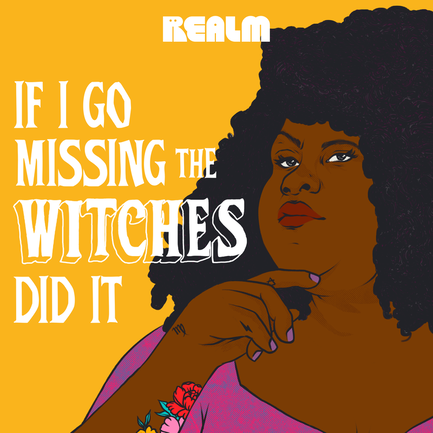 Pia Wilson is an accomplished television writer, screenwriter, and playwright, and she is also the writer of the wildly popular Realm podcast, If I Go Missing the Witches Did It, and she was kind enough to sit down with NTG and discuss her podcast, her career and the craft of creative writing. John Betancourt: What was it that got you into writing? Pia Wilson: Ah, you know, I got praise in school for this calendar of poems. And my teacher said one of my poems was profound. And of course, you know, I fell in love with the praise, and I started writing from there. I wanted to be the great American novelist. That didn't work out… yet. But I got into writing films, and then I wanted to, move forward from there. And so, I found the theater. You know, I found writing as a playwright really worked for me. And then I got into TV writing. And from there, I got to meet the lovely people at Realm, and I got into podcasts. So, it's been a journey. I love writing. John Betancourt: What is it then, that’s kept writing so engaging for you? Pia Wilson: You know, the characters come to me. So, they have a need to be birthed into this world. If that makes sense. It's my responsibility to tell their stories. John Betancourt: What then, led to the creation of If I Go Missing the Witches Did It? Pia Wilson: Well, you know, I was looking for a project to do and I, I met Rhoda from Realm, Rhoda is one of the producers on If I Go Missing, and I was introduced to them, and they had two story ideas. And I fell in love with the idea of a writer crossing paths with a coven of influencer witches. So, then I developed it from there. John Betancourt: Now something that caught me off guard with this podcast, is the amount of depth and meaning packed into it. What motivated you to pack so much commentary into this story? Pia Wilson: I'm a political writer, first and foremost, you know, characters first. I like to explore our society and what's going on and project to the future or look to the past and how that informs the present. So, I guess I've always written this way. Making a difference and having a voice and observing what's happening in our culture is very important to me. So, it was natural for me to make that part of this podcast. John Betancourt: Also, it is probably the most refreshing witch story that I think I've ever I've ever dealt with personally. What went into the motivation of making it just so… incredibly different and original from anything else that's been out there on the market before? Pia Wilson: Well, thank you very much, first of all, and, you know, I did a lot of research. First of all, I like the idea of magic to me, that is like – the little kid inside of me, is like jumping for joy. I've always love I've always loved like, witch stories, fairy stories, anything magical. You know, I was always into it. But it wasn’t very modern. It was always like; the witches came from nowhere. And they were dressed in a very old style, you know, the most modern we got was like The Craft and stuff like that. And I was like, well, there are witches, like, witches still exist. So, what does that look like? And then I got books on magic and what the actual ritual rituals are and so I tried to keep it grounded as much as possible while still having fun. John Betancourt: Speaking of getting into that process, because it's a pretty well-known fact that writers have to get into a certain mentality to get a certain piece done. What did you do to get into the mindset to really assemble the story? Pia Wilson: Well, I'm a writer, so that part was easy. And I do have a lot of mental chatter that that happens. So, I know that style of thinking and judging yourself, which Elise does a lot, and, you know, taking some of the things that have happened to me in my life, and kind of infusing the story with that. As far as the magic part goes, you know, I have books on witchcraft, I have spell books, I have Tarot books, I have all kinds. I'm a bookworm. So, I was like, I was just taking parts that seemed to work for this story and use my intuition a little bit. And I also have a family that's kind of mystical at the same time. So, I was able to sprinkle a little bit of that in. And, you know, it seems like, my whole life has been geared towards writing this podcast and writing about witches and I love sci-fi, too. So, I have like, a sci-fi play. I dream of making a sci-fi TV series, you know, like, this is my “realm.” Ha. Ha. John Betancourt: Oh, look at that! That was good. Pia Wilson: They don’t call me a writer for nothing! John Betancourt: Now, obviously, a podcast is a vastly different format from novelized work and screenplays. And I would assume playwriting as well. What challenges did you run into in putting together this particular story and the format that it serves? Pia Wilson: Well, you know, I didn't have the crutch of special effects. I was like, oh, man, you know, like, people aren't going to see them working the spells, so you kind of have to describe it. And, to let it have the same energy that visual cues would have. So, it was interesting to think about describing the scene. It was interesting to work on that as a writer, describing the scene yet keeping it light. And so that people don't notice that you're describing so much. And making the magic… interesting. John Betancourt: Now out of all the underlying messages that you've injected into this, which one has the most meaning to you on a personal level? Pia Wilson: What makes the most difference to me, I think is the message of, you know, we need to give each other grace. Right? And that we're all living in our own worlds, of course, but at the same time, we're still connected. So, let's not judge each other to extremes. And also, at the same time, if you know you need to work on something, work on it, and don't subject other people to your mania. Like Elise wants to be, you know – not politically correct – she wants to be… a good person who's always on the right side. But in her pursuit of always being right, she is wrong. So much. So, I feel like, you know, she's social justice gone wrong. And I want people to have that intention, because it's a good intention, but to actually do the work that’s needed to do that properly, and also acknowledge that you're going to make mistakes. And we should allow each other to make mistakes, too. And Jenna, Jenna has her own issues, you know, like, she's let her anxiety, cause her to make mistakes as well. So, we have to acknowledge that on our end too. John Betancourt: You mentioned earlier, prior projects and prior which stories, and I really want to circle back on that. Because commonly, you know, writers tend to put elements from stories that influenced them into their work. Were there any bits and pieces from other witch stories that you wove into this as well? Pia Wilson: Let's see, I've been watching, you know, witch and fairy godmother stories since I was little, I would say that Practical Magic with Sandra Bullock and Nicole Kidman is one of my comfort movies. I love that movie. And that's about being true to yourself. There's a movie with Tia and Tamera, it's a Disney movie. I can't remember the name of it right now (Editor’s Note: the film is Twitches). But that movie always makes me laugh. Like one is the sun and one is the night and like I find that movie to be funny other people, might not, but it's funny. Also, Witch Mountain. That was from back in the day, like, the 70s and it scared me a little bit when I was little. I still love it. But the story that probably influenced this podcast the most in terms of writing it and structure and things like that is Frankenstein by Mary Shelley. Which also influenced another work of mine that was a play. But it's not the subject matter, it's the style in which she wrote it. John Betancourt: So, to start to wrap it up here, what are you most proud of when it comes to this series? Pia Wilson: I love that Realm gave me such creative freedom and so, I was able to make little observations and, you know, be funny in a way that wasn't like slapstick or anything like that and I was able to make that social commentary and leave it in there and feel… free! Freedom is very important to creativity, and so that is what allowed me to be as original as I was. You know, they didn't throw bad ideas at me, that I had to make work for some reason. They let me be who I am. John Betancourt: Okay, before we go, without spoiling, what are you most forward looking to listeners experiencing as we come to the close to the end of this of this podcast? Pia Wilson: Oh, there's so much fun coming up. But I can’t spoil my favorite thing. So, Jenna coming into her own is one of my favorite parts. John Betancourt: Well Pia, thank you so much for your time today. I really do appreciate it. Pia Wilson: Thank you! This interview was lightly edited and condensed for clarity. To experience ‘If I Go Missing the Witches Did It’ visit Realm’s website, here, and to check out our spoiler-free review of this podcast, click here.
0 Comments
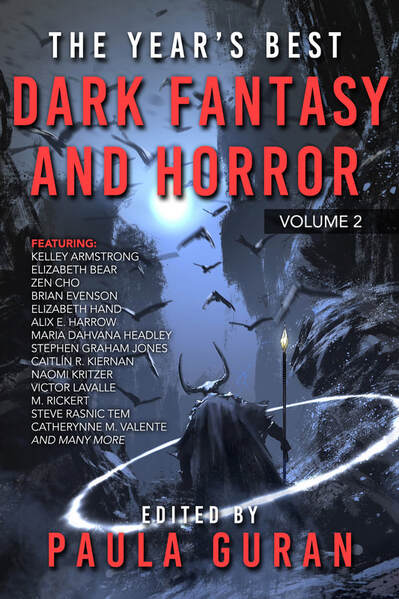 Paula Guran is an accomplished editor of horror, science fiction and fantasy anthologies and novels and to celebrate the release of the latest anthology she’s worked on, The Year’s Best Dark Fantasy and Horror: Volume Two, we had the opportunity to sit down with Paula to discuss her career and her new anthology. Nerds That Geek: You’re very connected in the horror and fantasy community. How did you get your start? Paula Guran: Back in the mid-nineties, no one had ever heard of such a thing as a e-newsletter. I started one for horror writers (and others) as part of an AOL writing workshop I had fallen into running. I was reviewing and interviewing folks as part of it. People were nice and one thing led to another. Although I doubt whether I am as well connected as I once was. NTG: You edit science fiction, horror and fantasy collectively, but does one of the genres stand out for you as a favorite? If so – why? Paula Guran: Not really. I was always a voracious reader and liked science fiction first. I also liked fantasy but wasn’t as aware of it. Horror wasn’t really marketed as such when I was growing up. I became better aware of speculative fiction more broadly in the eighties when I started reading Asimov’s and F&SF on a regular basis. Later on I became aware of a lot of modern horror I didn’t know existed. Now I probably like all three about equally. NTG: Is there a unique story or genre that you haven’t tackled yet that you’d love to review or edit? Paula Guran: There are still a couple of themes I’d like to do as anthologies. Overall, novel wise, I’s like to do more historical fiction. NTG: What inspired the story choices in this year’s anthology? Paula Guran: They are good stories. I also look for variety but basically it is just “good story”. NTG: What are you most excited for readers to discover about the stories in this year’s collection? Paula Guran: I always enjoy readers finding writers who are new to them—whether they are actually “new” writers or just new to the reader. NTG: We noticed that the majority of this year’s collection were written by women! Was that an intentional decision, or simply in line with the stories selected for Volume 2? Paula Guran: Just turned out that way. I don’t keep count as I choose stories. NTG: You’ve moderated and served on a number of panels all over the country. Was there anything you had to sit out throughout Covid last year that you were particularly sad to miss? Paula Guran: Yes and no. I haven’t been to a convention in five or six years. Initially that was just the result of several factors not the least of which was financial. I was always a regular at World Fantasy and often at Readercon. I also enjoyed Wiscon, IAFA, and SF worldcons. I’d still like to see friends in person and meet new people, but I don’t miss a great deal of the rest of it. NTG: To follow-up our last question - anything on the books that you’re particularly looking forward to attending this year? Paula Guran: Nope. NTG: Anything else you’d like to share? Paula Guran: My new series The Year’s Best Fantasy starts in mid-2022. 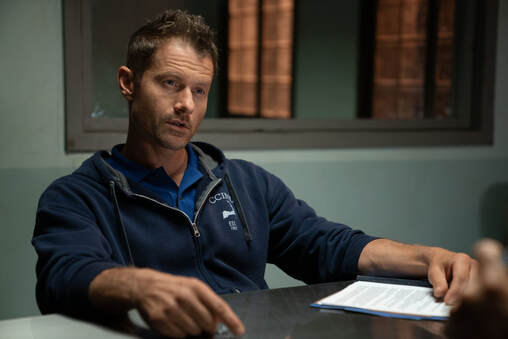 James Badge Dale is an accomplished actor with multiple film and television roles under his belt, and currently he stars as Ray Abruzzo on the STARZ series Hightown, and in anticipation of its second season we here at Nerds That Geek were able to sit down with James to discuss acting and his polarizing character on the show. John Betancourt: What was it that got you into acting? James Badge Dale: Oh man. That’s a big bold question! John Betancourt: I’m going there! James Badge Dale: How do I make that short? -pause- There was a moment I was I was doing theater in college and I was standing on stage and I’d been playing hockey and it just it dawned on me I was like, “I think I can do this and not get punched in the face.” You know, it was it was kind of the same thrill of being on stage. And this this electric feeling of, you know, you're just kind of riding that that razor's edge right there. And, you know, I came up in a family of actors, but that was that that moment was the moment I fell in love. I remember very specifically. John Betancourt: What was it that attracted you to the role of Ray? James Badge Dale: I didn't like Ray. That's what attracted me to him. You know, this has come up a few times today where people have been asking me; “I heard you didn't like, Ray?” Yeah, I didn't like Ray. I read. I read Hightown. I was like, well, this is the best script I've read. And I also don't want to play this character because he's an asshole. And then I went to bed that night, and I couldn't stop thinking about Ray. And you know, what you look for as an actor are things that challenge you. Things that you can play with, I don't like easy jobs, I want hard jobs, I want difficulties. I want challenges, I want risks. I want also want to relate in some sort of way. And I'm not a perfect person in any sort of way. So, in all these cracks and fissures in Ray’s personality, I saw an opportunity. And, you know, it just it just keeps becoming an extension of that. And this is a type of show where I think we continue to grow, we continue to change, the writing continues to challenge the characters. And that's what makes it fun to show up to work every day. John Betancourt: So, in keeping in line with that, since you mentioned Ray is an a-hole, how do you get into the mindset of playing someone that can be so rotten? James Badge Dale: Oh, man, um, you know, Ray doesn't know he's rotten. Ray thinks he's doing the right thing. You know, I think it's in those moments of, you know, when we don't know we're being selfish sometimes when we're being selfish. And it's not ‘till afterwards we look back and go okay, man, maybe I maybe I owe an apology. Or maybe I need to change my behavior. You know, there have been moments where I've showed up on set. And I've thought to myself, “I don't know how to do this.” Especially when you're working with people you really like, you know, so I love the people I work with, and Ray has not been good to some of these characters. But hopefully the other actors know that I'm not Ray. John Betancourt: Do you think Ray is someone that can be redeemed? James Badge Dale: I believe so. I always have to believe that you know? You have to keep running towards that and that's the thing, that's the challenge. Like, I want to redeem Ray. I need to Ray to be better. You know, for me as a human being I'm looking for Ray to get better, and maybe he doesn’t. That's where life goes too sometimes. You know, life… the universe is chaotic, man. And sometimes things happen that we don't like, and we didn't plan it to go that way. But that's just the way it is. And it's how you deal with those things. And you know, it's a necessary part of the job. John Betancourt: What are you most proud of when it comes to your work on Hightown? James Badge Dale: I'm proud of the overall. I'm proud of the ensemble, I'm proud of this group we have. I'm proud of the tone and culture that we have on set. It’s a vibrant, playful, creative atmosphere that's safe. And in that safety, it allows everyone to bring their instincts. You know, there's that idea of “we hired you because of you, bring you” and everyone's just pouring themselves into it. And it's cool, man, it's a real thrill and I've got a lot of gratitude, you know, so, we have, a fun set to work on. Come by and check it out. John Betancourt: I would love to. If that’s an official invitation, I will be there! So, without spoiling, what are you looking forward to the fans experiencing in season two? James Badge Dale: Oh yeah, well, this this season is such a roller coaster ride. You know, I gotta be careful about what I can say. I think it's kind of Shakespearean. I think it's an epic. It really rides that line between being a comedy or a tragedy. And sometimes both at the same time. All these characters are a lot fuller than they were in the first season, the stakes are higher. And the story moves at a fairly breakneck pace. And there's a lot of unexpected twists here. John Betancourt: Before we go, is there anything else you want to tell the fans out there? James Badge Dale: What else do I want to tell? Oh, man, check out Hightown on October 17. It's, it's a labor of love for all of us. And we hope you enjoy it. This interview was lightly edited for clarity. 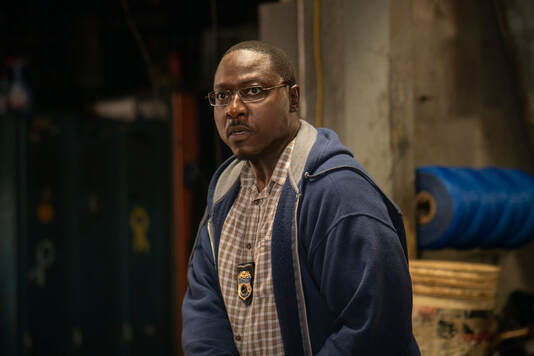 Dohn Norwood is a highly accomplished actor, and he currently stars as Alan Saintille on Hightown on STARZ, and we here at Nerds That Geek had the opportunity to speak with him about acting and the show, in anticipation of the arrival of season two of this dynamic series. John Betancourt: What was it that got you into acting? Dohn Norwood: Back in elementary school, I date myself, because, in the 80s we had some teachers that made it their business to create after school programming to kind of get kids off the street and stuff like that. And during school time, they created like a sort of a drama club kind of thing. So, it was a big deal, like a cool thing to be in drama club, because you got to do some fun stuff. And then you get highlighted in performances, you know, things like that. And so, I was a class clown, and you take a person like that, who loves attention in class, and then you stick them on stage and boom. So, then all of a sudden, I discovered in the fourth grade that I loved acting and wanted to do it for the rest of my life. So, I went to a middle school for performing arts and humanities I went to high school for performing arts and humanities, I majored in theater and English at Morehouse, I got my MFA from UC San Diego, so acting has been around for me for pretty much most of my life. John Betancourt: What that in mind, what was it that attracted you to the role of Alan? Dohn Norwood: Employment. -laughs- John Betancourt: Hey! That’s an honest answer! Dohn Norwood: Right, right, right. But also, just the gravity of it, you know, being the only black trooper on the force and dealing with the realistic dynamics of his, not just his personality, but having to finesse all that, and what his agenda is being sort of the good guy in a way and what it means to be the good guy, and then having to work, you know, in the trenches. Because obviously, you can't stay clean. You can't go in a coal mine, wearing a wedding dress and think, “you're not gonna get smudges”. So same thing here. It's just how is it going to come out for this the quote unquote, good guy. John Betancourt: What kind of research did you do to put together Alan as a whole? Dohn Norwood: Interesting enough, I’ve played a lot of officers and detectives. I play criminals too, but they don't know law enforcement. And having done research before, as well as having friends who've been not just officers, but in the military and having a certain frame of mind and how to handle those things. I had done research before, so I brought that with me, starting with the audition, pulled stuff out of my wardrobe that made me feel like I was a trooper on the street. Having my combat boots on and pants tucked in, and the, you know, the accoutrement on your belt, and all that kind of stuff, what all that means, you know, and how that makes you walk different stand different; your tone is different. And so, I've kind of built that up over time. Anyway. So, I brought all that with me, starting with the audition. John Betancourt: Now you mentioned realism there. That's something that I've noticed about Hightown, is that all the characters feel incredibly authentic. What as an actor, have you done to make sure that that Alan seems so pure? Dohn Norwood: First of all, there's great writing that reveals certain things and allows you to highlight those items. Okay, great. We're dealing with that now, you know, whether it be family or service and private moments, and how he deals with things, how does he decompress? How does he juggle these thoughts? How does he keep these things out of the home, or unfortunately, how does he deal with them when they come home, and all that kind of stuff. So, it's just having all that already kind of written and played with that allows you to, to examine and then exhibit what it is that they're revealing in the story and about the character. So, it's kind of put in front of us to begin with, to highlight and deal with. John Betancourt: So, how much of you, is in Alan? Dohn Norwood: There's always a bit of you. You know, people kind of wonder “how much did you know” about how despicable or whatever this person is, you just find those elements of yourself either where there's some 1% of something or 90% or just something you thought about. You know, some circumstance you found yourself in or even other personalities that you that you know, you know, even if it isn't directly a part of you, you've been around someone who was like that, and just digesting all that in and so building this person, and then the ultimate goal is to teach you. You don't want to pretend to act and it's piecing it together over time. And obviously, with any performance, the more you do, the more you understand, like a Broadway performance, right? You do it so long that eventually that last performance is nothing like the first one. And so, the more we delve into who he is and what he has to deal with, it defines him. And so, it's just a step by step and incremental exhibiting of who he is. John Betancourt: What are you most proud of as an actor when it comes to this series? Dohn Norwood: That it deals with things realistically, that we're not trying to haul around things or make them overdramatic. It is just, this is what you have to deal with from time to time and it doesn't get highlighted in some, you know, sort of just how "we're now dealing with this and now we're off that subject." Or there's a silver bullet and you kind of wrap things up. It's an ongoing process. And that's real life and I appreciate that, and that we get to deal with things in real time. John Betancourt: So, what then are you most looking forward to fans experiencing this season without spoiling anything? Dohn Norwood: Oh, absolutely. It's a lot of what we saw in the first season brought back out and then some new things and it's coming hard and it's coming heavy. So, there's no gaps. There's lots of brick and mortar and its solid, and you have to hit the wall fast. And so, every episode is dealing with all the different contingencies and elements of that universe. You know, as I said in another interview that it is kind of like seeing the, the part two of something right, you kind of get a taste of a person, and you're excited about the second one because you're like, oh, now we get to see more of those aliens or more of those worlds or all that kind of stuff. So, it's more of that and we get to delve even further into the universe of Hightown. John Betancourt: Anything else you want to tell the fans before we go? Dohn Norwood: Oh, absolutely, tune on October 17 in and I hope you're ready for, you know, the empire striking back. This interview was lightly edited for clarity. Fear the Walking Dead returns to AMC this Sunday, October 17, 2021 (9 p.m. EST/8 p.m. CST) and in anticipation of its arrival, we had the opportunity to sit down with several of the cast members to talk about their journeys on the show and season seven in general. Lennie James and Karen David John Betancourt: What did you as actors do to prepare for material that is, quite frankly, the darkest that The Walking Dead Universe has put together thus far? Lennie James: Held hands. Karen David: Hope for the best. Lennie James: I think when we prepare for any season, I mean, we've both been at this long enough now, that what we try to do particularly with the particular storyline that happens between Morgan and Grace, at the start of this season, is to do it justice, and to and to take both what we wanted to add to the scripts and what the scripts were encouraging us to do to the most realistic and logical kind of sense in a post-apocalyptic world. What does it mean to have to lose a child? What does it mean to, you know, to have a child in not just one apocalypse, but in a double apocalypse? That has to be the biggest gamble on hope and the positive sense of what the future might be. And to have that taken away? What real effect would it have on people regardless of the apocalypse, and we had to try our best to do justice to how a mother might feel about that and how a father would, however, much removed in in Morgan's case, but he's still connected because it was his dream to father that child. It was his dream to be husband to Grace and father to Athena and that you know, when he has a loss, what that loss looks like, and feels like, but how he also supports Grace. So, I think for me anyways, and I believe so for Karen, that what we tried to do was be honest about it. Karen David: Yeah, this was an opportunity for me to explore a different side of Grace, which Grace as we know is a very methodical, factual, kind of pragmatic being. So, to see her go on this emotional journey with losing her baby. And going through postpartum depression, there was a lot of research that I spent months doing during the pandemic before going back into season six, we had that break, so I had a lot of time to, to really dig deep and to go on different forums, and organizations that provided support for mothers and fathers that were going through infancy loss. And just to hear the stories from these very brave and courageous families who are willing to share their experiences, for me, was so important to infuse into Grace’s and Morgan’s storyline. So, it was it was deeply humbling and as an actor was really for lack of a better word, exciting to delve into. Especially for Grace. John Betancourt: What are you both most excited for fans to experience this season? Without spoiling Of course, Karen David: Oh, without giving anything away. I'm most excited for fans to see just how Epic each and every episode is, from the cinematography to the sets that our team have created. Just taking in this double apocalypse as Lenny said before, and the scope of it. I'm just so excited for fans to see because this season is truly much darker. Lennie James: Firstly, I'm looking forward to everyone seeing Coleman Domingo's costumes this season, because they are off the charts, just saying that, while everyone else is in a hazmat suit, and, and I directed two episodes this season, and I'm really looking forward to the fans seeing that. Jenna Elfman and Keith Carradine John Betancourt: John and June are characters that have a lot of issues with abandonment and trauma in their past. Do you both think this is the year that they finally confront those issues? Keith Carradine: I think the quest for peace will continue. I think that John's searching for some kind of healing, some kind of center that he can find in himself, that justifies his own survival, and not to mention his, whatever ability he might have to aid in other people's survival as well. This is a guy who has been fighting for the law for his entire life. And that idea of the morality of adhering to the law, that there are laws for a reason and that we must obey them to have a civil society. Well, what's left of that now, that's a big question. And whether or not he can continue to have a positive effect in his own life and on the lives of anybody that's around him, especially considering the amount of loss that he has experienced. Jenna Elfman: I think there's, you know, through each one of those evolutions that we've already seen them go through lessons have been learned, you know, so not every trauma is the same, because each trauma they encounter, they've got a backpack full of lessons they've learned. And there's a learning curve of them digging themselves out of those traumas, and they come away with some knowledge. So, this is now a brand new one with this nuclear apocalypse and the damage it does to them emotionally and spiritually and so I think that it's probably like the most extreme you can go that we can all think of, aside from the actual planet just exploding, and so it's, it's great, because I love that the writers chose this because it takes everyone to literally the edge of the earth, of who am I? Who am I going to be? Which pocket am I going to dig into? Which pocket of experience? Which pocket of knowledge, which pocket of emotion? Which pocket of purpose am I going to dig into to get myself through this to find my friends? Or, you know, do people need to not look for their friends? Is it just about that, like, where does this take them? It changes people when it gets this extreme. And so, I think that it's not necessarily about finding peace. Peace is a relative term, what is the new normal? Which cloak do they have to put on to move forward, and I think each character's choice of cloak is going to be very revealing moving forward, and also beautiful strings that connect to the greater Walking Dead universe of story of things that go on, and the phenomena that occurs with each of these characters sort of establish some new territory that inform the greater whole moving forward, which I find thrilling. And I love June's thing. So, I think we saw a dose of all this, with her taking it upon herself to kill Ginny. And giving no F's about it, you know, it's her sort of going in and deciding what she needed to do, not what John said to do, not what Morgan said to do. This is what she needs to do. And she has that right to think for herself, and to make a decision for herself of what needs to happen. And I think we're going to see more of that moving forward, which I really enjoy. Christine Evangelista, Mo Collins, and Alexa Nisenson John Betancourt: I've noticed over the past couple of years for all of your characters that each and every one of them is searching for something in their respective seasonal arcs. Without spoiling, what are your characters searching for in season seven?
Mo Collins: They're searching for Wendall. You know, because they got on that helicopter or she got on the helicopter, he didn't, so you know, in that search in and of itself, it turns into an introspective for her because without Wendell, who is she? So that is what is being discovered is who is she without, you know, like, when we lose someone, whether it's, the ultimate loss or just through a relationship breaking up, whatever it is, it's like, you kind of have to rediscover yourself, and find out how you proceed, right? And you have to look at yourself. And that's the hardest damn thing, isn't it? To look at yourself, you know, and grow, God help us. But that's really what Sarah is confronted with, as much as she loves and appreciates the people around her. And they're great support. It's really, how does Sarah do it without them? What gets her up when her reason for living isn't around? Alexa Nisenson: I think this season Charlie is really searching for some semblance of a better life and more hope and a better situation. And she, of course, is searching for the rest of the group and wanting answers if they're okay, where they are, you know, because everybody is kind of in their own situations, you know, they really don't know if everybody's okay and if everyone made it out, so I think she's searching for that. But she's also searching for a chance to be happy, which I think is really special and we really get to explore that, which I'm really excited about, Charlie's happiness. Christine Evangelista: I think Sherry physically or externally I think really is just searching for somewhere safe. I think we all are looking for somewhere safe, somewhere where we could breathe – literally breathe, you know, because everything is just so dangerous. And I think internally you know, very similar to what Alexa said, I think Sherry's looking to be happy and I think Sherry is looking to continue to heal herself and apply everything she's learned from last season and looking to you know, be with Dwight and do it with Dwight in this new way, the best way that she can, given everything that she's learned. John Betancourt: I want to say, first of all, that you all have made an amazing impact on the show, in a very short period of time. And with that in mind, what are you most proud of as an actor when it comes to your contributions to Fear the Walking Dead and The Walking Dead Universe? Christine Evangelista: Thanks. I was proud of telling this story about a love not being lost and reunited and hope and when you hold on to hope, you can will things to happen in your life and I think that has been such an uplifting story and I've loved how people responded to that and being a part of that was emotional, also. I think also, I mean for me as an actor on the show I just think the physicality of it is really, really rewarding and I pushed myself beyond the limits that I thought that I had and the strength that you need you know, emotionally, but really physically on a show like this and it's totally empowering. I've been very empowered by the show. Alexa Nisenson: Adding onto what Christine just said, I think one of the things that I'm the most proud of is how I have pushed myself over the past couple of years. I've never done a project like this at all where there's you know, so many intense stunts and things going on and the physicality to the show is such an important and huge aspect of it. It's not just about the dialogue, it's the whole picture and that is something that I had never done before and I think we have all pushed ourselves to do some crazy intense amazing things. But in the end, it's so worth it because when you watch it's just like, “wow, like we all did this we all create created this and did it in real life.” You know, we all have to do those things, but it's so worth it when you watch it. And I think we have all pushed ourselves and made each other really proud. Mo Collins: Thanks, by the way, that's a really nice compliment that you gave to all of us. We appreciate that. Um, I think for me, you know, one of the things I'm super proud of is being a source of light in this dark world. That was my assignment as a comedian to come in and I do believe it sounds a lot easier than it is, because drama is not the same world that I come from. And so, to come in, you still have to be taken seriously. And so that was a really great thing. And I'm very proud of the way I handled that. And the things that I've done with Sarah, to not only bring in that comedy but to have a truly authentic character going on. She's more than just funny, she is heartfelt. And she is authentically Sarah. So, I'm really proud of what I've learned how to do, you know, to come into the world of drama and you know, to do to do something so completely different for myself. I'm not – it's just it's so far off from doing like Joan Callamezzo from Parks and Rec, which is all dressed up and makeup and heels and everything and to like, settle into this. She's the realist. And she's the closest character I've ever played to myself. And so, learning how to do that as an actress has been really, really satisfying. And I'm… I'm proud and I feed myself cake because of it. These interviews were lightly edited for clarity. 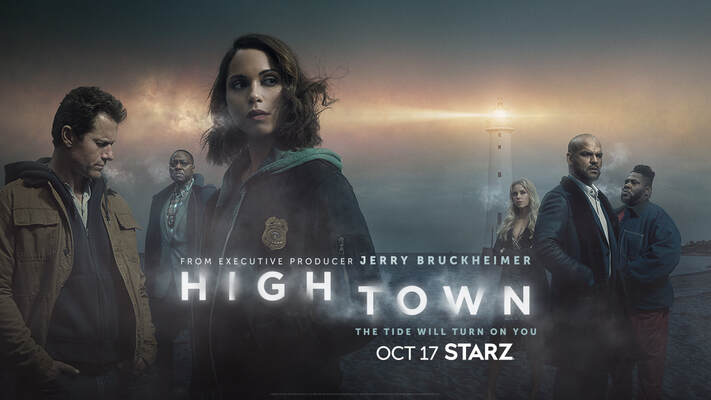 Gary Lennon is a decorated television producer and writer, and he currently serves as an Executive Producer on Power and Hightown on STARZ, and we were lucky enough to spend some time with Gary to learn more about the creation of Hightown. John Betancourt: How did you get involved with Hightown? Gary Lennon: Basically, an executive at STARZ had read the script and thought that I would like it because he knows my taste. And he knows that I vacation in Provincetown, I'm also sober. I think he knows that I like trying to uplift characters that usually don't get to see themselves on screen. I think he knew that I would respond to a Latin-X lesbian character who was in recovery. And so, he sent me the script, and asked me if I would want to get involved. And I read it. I said, “Yes,” they set up the meeting with Rebecca, and with Bruckheimer TV, and we all sort of had a very similar idea of where we thought the show could go. And that's how I got involved. John Betancourt: What did you do to flesh out a lot of the elements you just discussed? Gary Lennon: Basically, what happened is after STARZ decided to buy it, they wanted to know what the second episode was. So, Rebecca, and I basically sat in a room and just talked about what that second episode would be. And then after that, you know, because Rebecca, and I got story credit on that second episode, STARZ was happy enough to order a writer’s room. And then we got into a writer’s room and decided, with another group of writers of what that season would be, and then we broke the season out, and then we pitched it to STARZ, and they were happy. And then they ordered us to series, which is what every writer dreams. John Betancourt: Now, I would assume season two was assembled during the time of COVID. What kind of challenges and logistical issues, did you all run into, putting together a season two during this very interesting time in the world? Gary Lennon: It was really difficult. And honestly, I have to give it up to a lot of other people who did their job way better than I would. There's a woman named Ellen Schwartz, who's an executive producer on the show who was on the ground with boots on ground. And you know, she made sure all the protocols were seen to, and there's a woman named KristieAnne Reed and a man named Jonathan Littman who runs Jerry Bruckheimer TV, who you know, crossed all the T's dotted every I, and they were super involved in making sure that our cast and crew would be safe. And honestly, those people are our heroes. They're the ones who deserve the medals and all that because they got it done. And our crew, of course, and our actors, the idea that they would show up under very uncertain times, putting themselves at risk. And, you know, it was our job to make sure that they felt safe because an actor needs to feel safe in order to give us their best. And honestly, I'd have to say that Ellen, and KristieAnne and Jonathan and Rebecca really did that and made a safe environment so we could have a second season. John Betancourt: I couldn't help but notice, that the series is very anti-drugs. And that's a good thing. I'm curious, what went into the decision to make this show such a focus on the dangers and the horrors of addiction and drugs? Gary Lennon: You know, I think it all starts with Rebecca. And Rebecca’s pilot, because, you know, Rebecca wrote the script without any of us being involved. And so that was her brainchild, her desire her ideas, I know that Rebecca has really strong feelings about addiction, about recovery and about redemption. And I think that was one of the reasons I wanted to get involved with the show myself, I'm sober for a long time. And Rebecca and I and a lot of people that we work with have lost people to addiction. And it was important that we portray that, and there was a lot of people in the writer’s room who were sober and addicts themselves. It was important to all of us just to portray addiction and recovery in a very truthful and honest way. And so, I would say it came from a real personal place for all of us, but mostly for Rebecca, who created the show. John Betancourt: Now what would you say, you’re most proud of when it comes to this series? Gary Lennon: I'm really proud that we have a lead, who is a Latin-X lesbian, who is quite obviously queer. And that's just part of her story. But it's not her whole story. So, we're not writing about someone coming out. It's just a part of her story. And I think that the more that we can do that with queer stories, that would be great. Because, um, you know, it's just part of your life, it doesn't define exactly who you are, it's just a part of who you are. John Betancourt: That makes total sense. And speaking of that, the characters are incredibly rich and incredibly realistic here. What went into the decision to make them so incredibly human? Which you don't sometimes see on TV. Gary Lennon: Yeah, well, thank you for that, you know, again, it starts that starts with Rebecca, writing that script before any of us came to the table with her. But then, you know, all of us have really just have the desire to write characters that live truthfully, under imaginary circumstances. And I think, you know, we want – I know that I when I'm watching TV – I want real situations with real dilemmas, and I want to see people make mistakes, and I want to see them correct those mistakes. I find it very interesting, the theme of, you know, are you defined by your biggest mistake? And the answer for that question is different for everybody. And so, I would say, all of us, you know, I mean, we go around the room, like a draft will come in, or an outline or an idea would be passing me. And you'd have an opposing idea. Someone would say, “oh, that doesn't feel honest and that doesn't feel real.” And we would debate on many things until the room felt that we had hit the truth. And then it was our job to put the truth on the page. And then it's the director's job to photograph that truth. But I would say our jobs as writers and executive producers – and by the way, the scripts go through many reads by many different people to say, “Oh, this seems fake, or this seems false.” And then it's our job to sit with that and make it real. John Betancourt: Speaking of realism and because you mentioned this, how much influence did your experiences in Provincetown have upon the show? Gary Lennon: A lot. You know, Rebecca has been going there since she's a kid. I've been going there since 1982. And you can't help but tell stories that happen to you, and scenes that you saw, or interesting characters that you met, and then we try to put them on the page. So, I'd say this authenticity exists because we're not tourists in that world. We were natives. John Betancourt: So, my last question today is, what are you most looking forward to audiences experiencing this season? Without spoiling, of course. Gary Lennon: That's a great question. I’m looking forward to the audience's reaction to the unlikely alliances to develop over the course of this season. I think we put people together who you wouldn't expect. So, we have endings of storylines that are unexpected and surprising. This interview has been lightly edited for clarity. |
Archives
April 2025
|
|
© 2012-2025, Nerds That Geek LLC.
All Rights Reserved. |
uWeb Hosting by FatCow

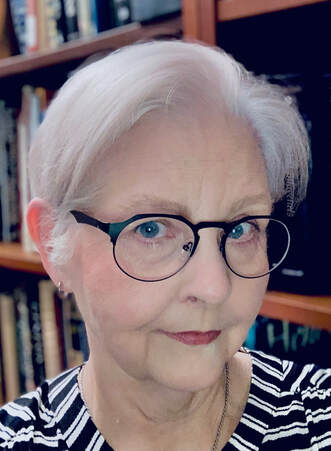
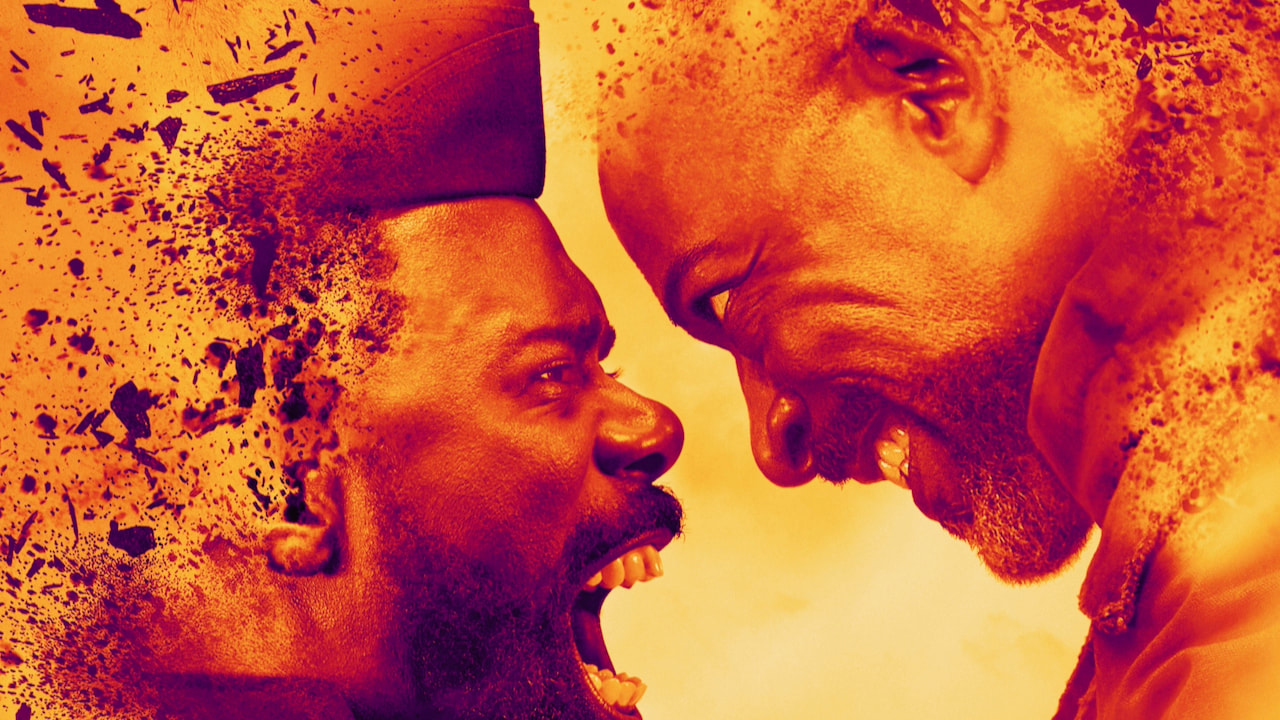
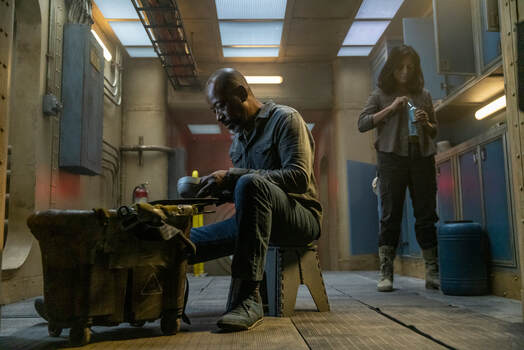
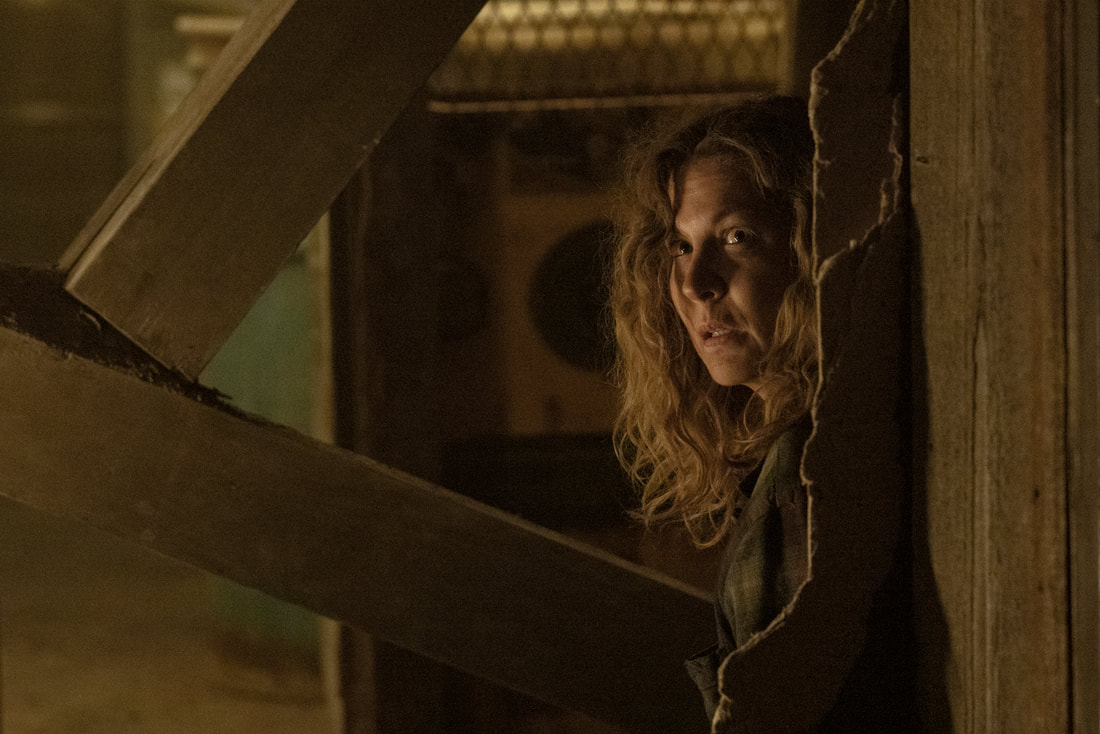
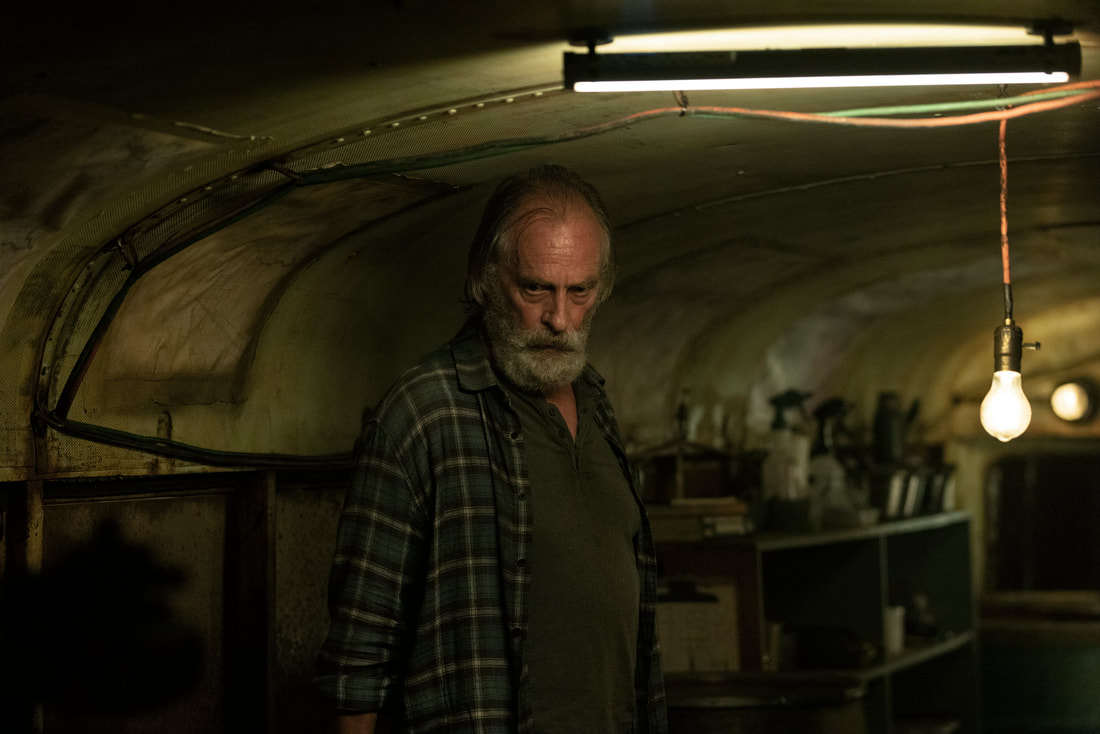
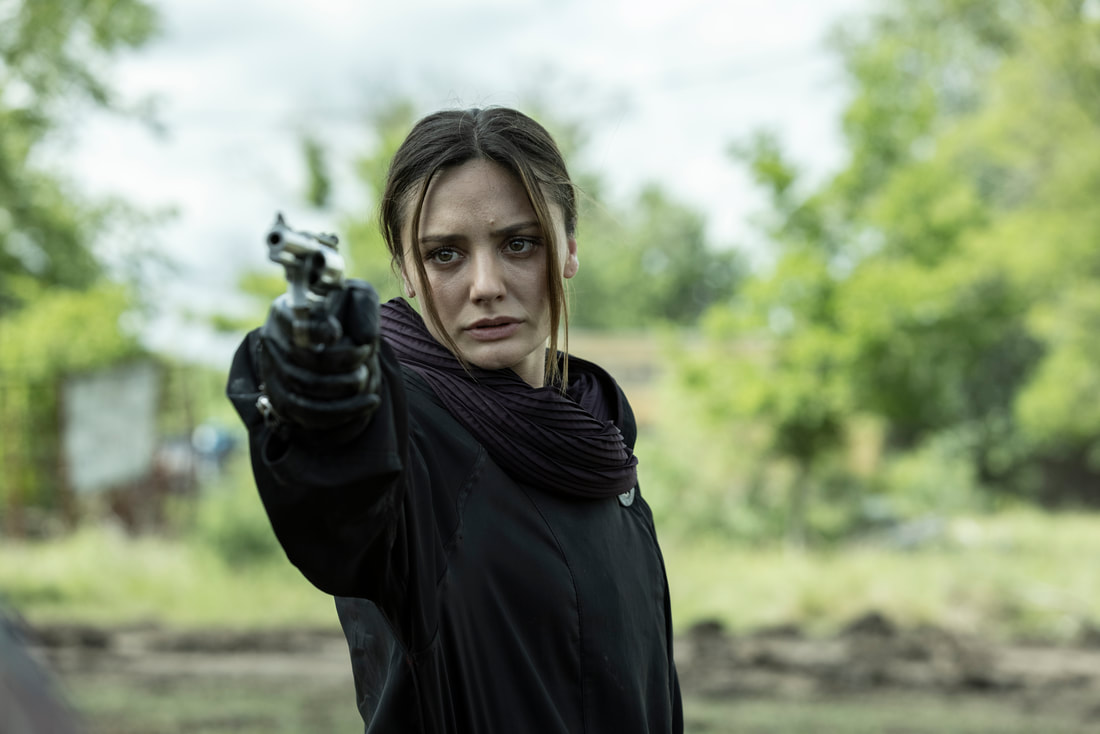
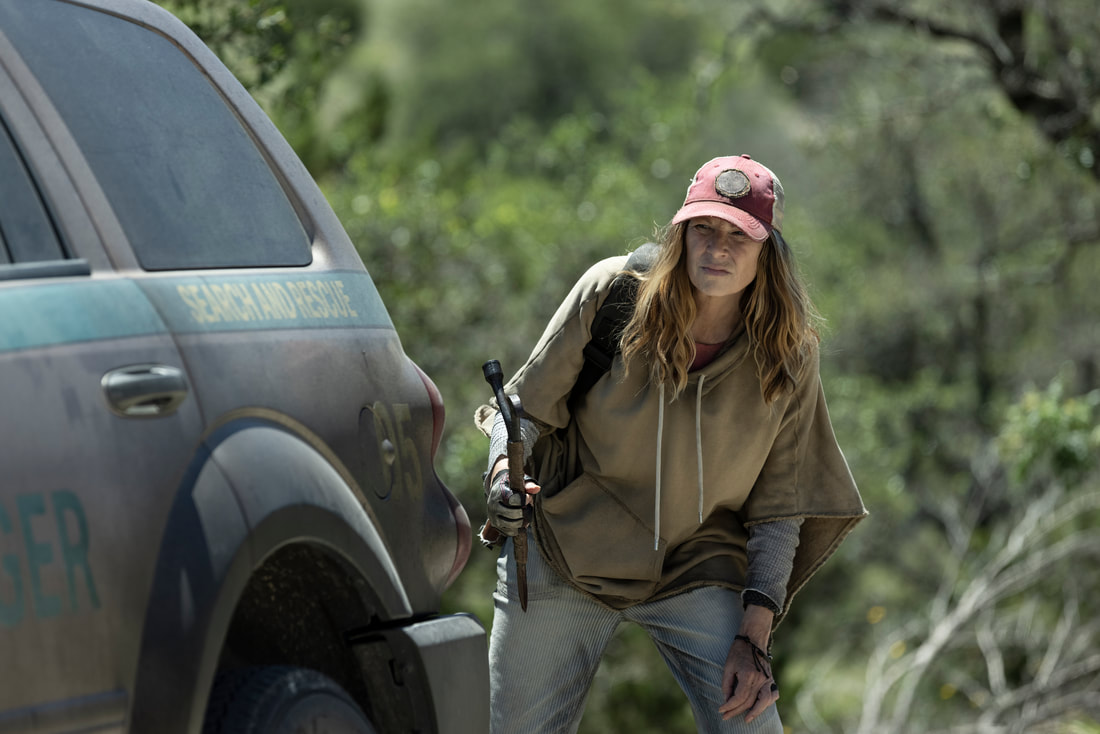
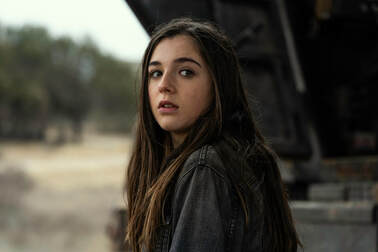
 RSS Feed
RSS Feed